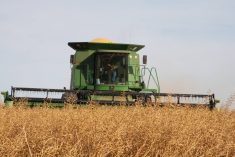The class action focuses on two varieties of corn sold to North American producers before China gave them the green light
The Ontario Court of Appeal has ruled that a class action lawsuit by all corn farmers in Canada can proceed against Syngenta.
Syngenta is seeking leave to appeal the decision to the Supreme Court of Canada.
“Accordingly, since this matter continues to be considered by the courts, Syngenta has no comment at this time,” company spokesperson Christina Stroud said in an email.
A similar class action case in the United States resulted in a 2018 Syngenta settlement worth US$1.5 billion for U.S. corn producers.
Read Also

Crop quality looks good this year across Prairies
Crop quality looks real good this year, with the exception of durum.
Both cases surround an allegation of premature commercial introduction of Syngenta’s Agrisure Viptera and Agrisure Duracade corn.
Both types of corn contained a genetically modified trait called MIR 162 that made the corn resistant to insects.
The problem was that the seeds were sold to farmers in North America before the trait received final approval in China.
The claim alleges Syngenta failed to take the proper identity preservation measures to ensure its GM corn would not contaminate corn exports heading to China.
In November 2013, China stopped accepting corn from North America, creating a glut of corn that pushed prices down.
“I would say for two or three years the prices were significantly depressed,” said Matt Baer, a partner with McKenzie Lake Lawyers, the Ontario firm that is trying to launch the class action suit.
“Whether they have fully recovered even now or not is a matter of debate.”
He said it is too early to calculate the amount of the claim.
The U.S. has 10 times the population of Canada, so settlements in Canada are often about one-tenth of the U.S. amount, which would be US$150 million.
“That is typically how you look at it,” said Baer.
“You’re in the right magnitude.”
The Canadian case is taking far longer than the U.S. case to wend its way through the courts.
One reason why is Syngenta won its initial summary judgment motion in Canada that there is no legally recognized cause of action but lost that same motion in the U.S.
Farmers will have to wait for the Supreme Court to rule on Syngenta’s appeal before attempting to get their class action suit certified.
If the Supreme Court upholds the Ontario Court of Appeal decision, the class action will likely be certified.
It may then take another three years before it goes to trial, unless Syngenta opts for an out-of-court settlement.
“It’s really up to Syngenta. If they wanted to resolve it, we would work with them in working out something reasonable,” said Baer.
“So far, they’ve shown no willingness to want to resolve it, so we have to just keep pushing forward.”
He knows of no other class action suit that has been filed against the company in Canada other than the one filed in Quebec by another law firm under the direction of McKenzie Lake Lawyers because Quebec uses civil law instead of common law.
Baer said the class action automatically includes all Canadian farmers who brought corn to market after November 2013.
At some point, if there is a settlement or verdict, there will be a claims process requiring some sort of evidence that farmers produced and sold corn after that date.
Farmers can ask to be added to a McKenzie Lake Lawyers database to be notified when they have to file a claim form.


















